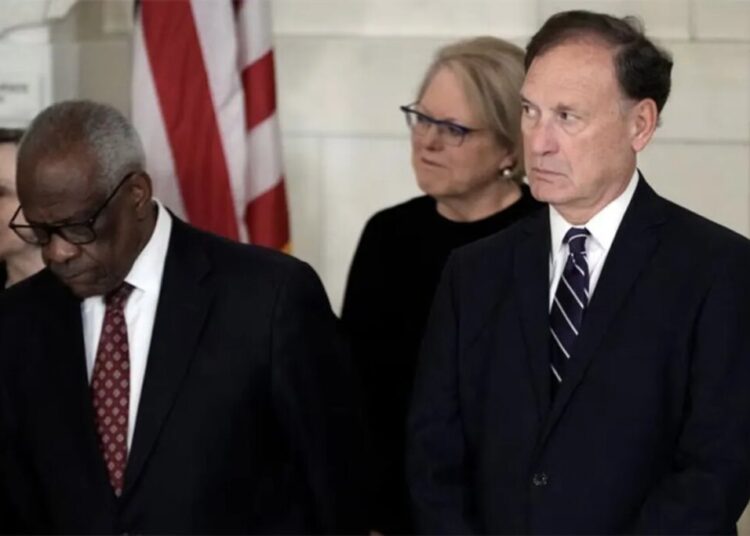The Democratic Party’s crisis isn’t just about policy — it’s about courage. Or more precisely, it’s about what happens when a political party forgets how to fight for anything beyond the preservation of its own respectability.
This became apparent during the recent government shutdown negotiations, when seven Senate Democrats and one independent caved to Republicans while telling themselves they were being responsible stewards of democracy. The episode crystallized a growing chasm between Democratic leadership and a base that’s tired of watching its party get outmaneuvered by opponents who understand that politics is about power rather than politeness.
The Democratic Party’s crisis isn’t just about policy — it’s about courage. Or more precisely, it’s about what happens when a political party forgets how to fight for anything beyond the preservation of its own respectability.
This became apparent during the recent government shutdown negotiations, when seven Senate Democrats and one independent caved to Republicans while telling themselves they were being responsible stewards of democracy. The episode crystallized a growing chasm between Democratic leadership and a base that’s tired of watching its party get outmaneuvered by opponents who understand that politics is about power rather than politeness.
I spoke this week to Rep. Ro Khanna (D-California), a potential 2028 presidential candidate and one of the first Democrats to call for Senate Minority Leader Charles E. Schumer (D-New York) to step down shortly before the vote passed on Sunday. “We need a total makeover of the Democratic Party,” Khanna told me, his frustration barely contained. “There is no establishment. The powers that be are weaker than they’ve ever been before.”
Khanna’s critique points to a generational divide between Democrats who still believe in the fantasy of bipartisan governance and those who recognize that we’re living through an authoritarian moment that demands actual opposition. I keep returning to something Khanna told me about Democratic leaders who see themselves as “guardians of institutions as opposed to responding to the populist moment we’re in.”
There’s something almost tragic in that phrase. These are elected officials who came of age believing in a certain version of American governance, where reasoned deliberation eventually wins out, where being “the adults in the room” means something. They’ve spent decades mastering the choreography of legislative compromise, only to discover that the music has changed entirely.
Here are excerpts from our conversation, edited for clarity.
Shadi Hamid: Briefly lay out the case for why Sen. Chuck Schumer should be replaced.
Rep. Ro Khanna: Sen. Schumer has lost touch with the grassroots base of our party. If you’re not going to fight for health care, then what are you going to fight for? The reality is that Schumer deserves credit for being a master legislator during the Biden administration. He and I worked on the Chips Act together, which would never have passed if it weren’t for him. But he has failed to meet the moment when it comes to this time in history.
He has been on the wrong side of foreign policy, a cheerleader for the war in Iraq, an advocate for a blank check of funding to [Israeli Prime Minister Benjamin] Netanyahu, a person who refused to endorse [New York Mayor-elect] Zohran Mamdani.
The argument on the opposite side is that Democrats had already made their point. They were able to successfully place the blame on Republicans. The American people responded in turn last week, as Democrats swept elections in key races. But federal workers were feeling the pain. Americans receiving benefits through the Supplemental Nutrition Assistance Program, or SNAP, were hurting, with millions facing food insecurity as a result. Why not stop the pain?
That’s a political way of looking at it. For me, it’s an issue of substantively improving people’s lives. Someone just came up to me at an airport two days ago. And they said, “Look, my father is a taxi driver in Arizona. His premium is going to go up from $44 a month to about $2,600 a month, and he’s got cancer. His deductible is going to go up from $800 to $6,000. What is he supposed to do?” We have abandoned those individuals. I believe we could have gotten some relief for them. We could have gotten a one-year extension, if not a permanent extension of Affordable Care Act credits. Republican Rep. Michael Lawler [of New York] already floated that. We could have opened up a conversation about eligibility even and had some compromise on that in terms of the income levels of people who would qualify. But by basically not getting any of that, we have subjected about 20 million Americans to extraordinary pain.
I think there’s also some confusion about what actually happened. Schumer himself did not vote with Republicans. It was seven other Democrats and an independent who did. Perhaps they’re the ones who deserve more of the blame here? Isn’t there a risk of making Schumer into a scapegoat when the problem runs deeper in the Democratic caucus?
Well, this is the D.C. dance. Everyone knows that Schumer was consulted at every step of the way by these eight senators. The senators have said that themselves, that they were keeping Schumer informed. Schumer’s No. 2 person [Sen. Dick Durbin of Illinois] is voting for the bill. It’s hard to imagine he would do that if Schumer was telling him no. And certainly Schumer never said publicly to members of his caucus don’t vote for this. This is something that if Schumer wanted to stop, he could have.
The disappointment with Schumer and Democratic leadership had been building. This is just what pushed things over the edge. In a two-party system, and with President Donald Trump’s authoritarian designs, you need the opposing party to actually oppose — and to be seen as fighting. Instead, Democrats have seemed feckless and aimless. The failure to rise to the occasion has been somewhat mystifying. Why do Democrats seem to have so much trouble growing a backbone?
It’s a generational issue. You have people who have been in office for 10, 20, 30 years who believe in a certain way of doing things, of being the adults in the room. They think they’re acting responsibly and keeping the institutions of government running. I’ve talked to enough of the Senate to know that they believe the House runs too hot, and that they’re the cooler heads that kind of preserve order in our democracy.
So they are viewing things as sort of guardians of institutions as opposed to responding to the populist moment we’re in. And that populist moment is saying institutions have failed us. The younger generation gets that. And that’s why, you’re right, this was building with Schumer. We need a total makeover of the Democratic Party. And it’s doable. There is no establishment. The powers that be are weaker than they’ve ever been before. It’s a total open field running for the Congress, the Senate and the presidency.
Isn’t there something to be said for preserving institutions and order, considering how much Trump has run roughshod over them? Isn’t there an argument for taking the higher moral ground and saying let’s not try to burn things down and let’s keep the institutions running even if they’re flawed?
The traditional Democratic argument is the preservation and restoration of institutions. The Trump argument is that those institutions didn’t work, and we need to burn them all down because they led to the hollowing out of factory towns and rural America. The Democratic answer needs to be that we need to have transformed institutions to work in the 21st century, that we certainly need to be building things up instead of tearing them down, but that the institutions of the past have failed the working and middle class, have failed rural communities, and that we need a new institutional framework rooted in our constitutional tradition to address the decline of the American Dream. I call that economic patriotism.
Speaking of transformation, you alluded to Schumer’s refusal to endorse Zohran Mamdani. And the same goes for [House Minority Leader] Hakeem Jeffries, who only offered a tepid endorsement at the last moment. Was that a sign that something had definitively gone wrong with Democratic leadership to not support a candidate who won by a clear margin in the primary?
These are cumulative factors. The biggest were the two times that Schumer failed to stand up during shutdown negotiations. But then his knocking [progressive Senate candidate] Graham Platner in Maine. Putting his thumb on the scale on these races has sent a terrible message to young voters and progressives.
His inability to recognize the phenomenal campaign of Mamdani speaks of a tone-deafness. And the reality is, I thought Barack Obama had ended the career of anyone who voted for the war in Iraq. But then, when these people like Schumer — who cheerleaded us into the biggest disaster in American foreign policy’s modern history — also showed a total moral obliviousness to Gaza, that also contributes to his need to step aside. Look, Donald Trump obliterated the pro-Iraq War constituency from his party. I don’t understand why we can’t sideline the pro-Iraq War constituency from our party.
What would you say to critics who say that progressives like yourself are using this call for Schumer to step down as a way to create tensions within the Democratic Party in an effort to remake it in a more progressive image? How much of this is a kind of power play for progressives?
If the question is “Will the fight with Schumer help us in the effort to reshape the Democratic Party?” — I plead guilty.
Gaza is a major divide within the party, where you have a leadership that is pro-Israel and deferential to Netanyahu and a base that is increasingly pro-Palestinian. The party risks hemorrhaging young progressive voters if it can’t speak truthfully about what happened in Gaza. But how do you resolve that internal tension? Because what that means is that Democrats may not be able to offer a unified front on one of the biggest moral questions of our time.
I believe this will be a fault line in the 2028 election, and the nominee will determine the direction of the party. If you did not vote against the $14 billion in aid to Netanyahu, then you are basically in a similar position to those Democrats who voted for the war in Iraq. If you’re unwilling to recognize the United Nations finding that there was a genocide in Gaza, then you are out of touch with where Democratic voters are.
The post Why Ro Khanna thinks Democrats need a total makeover
appeared first on Washington Post.




